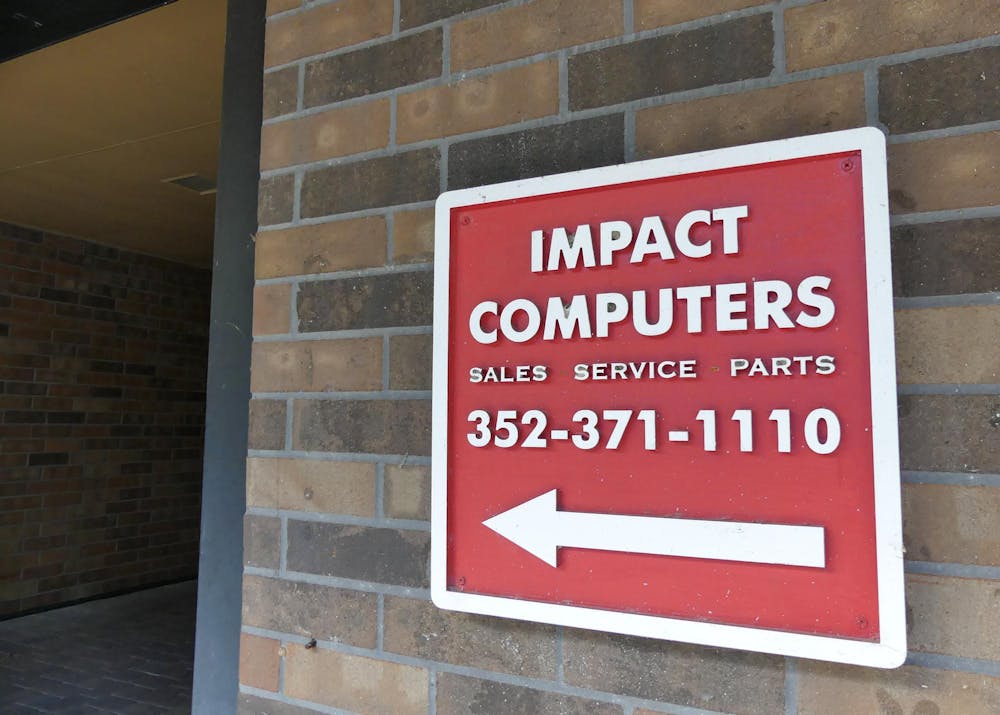Read more from The Alligator's "Ripple Effects" special section here.
David Miller has been finding quick fixes for more than just his customer’s computers.
Miller is the current owner of Impact Computers, a Gainesville installation he has helped operate for over three decades. In the past few months, he said, rising costs and delivery delays have hindered his most straightforward repairs.
“I'm getting to the part where I will order a thing, have tracking information on it, and then it will vanish,” he said. “And then I will never get that part.”
This trend, Miller said, is the result of fluctuating tariffs propounded by the Trump administration.
Almost a year into his second term, Trump has built an expansive web of tariffs. A baseline 10% was introduced in April across all countries, followed in August by dozens of tariffs targeting specific imports — pharmaceuticals, steel and aluminum, copper, furniture and automotive parts — and countries such as India, Brazil and Japan.
Tariff negotiation fallout has also rippled into the technology industry, with duties raised against key manufacturing countries like China, Japan and Malaysia. Small parts production can be outsourced to one country while assembly is in another.
Miller said there’s been price increases for simple items like screens and batteries. Sourcing parts requires more work as supplies dwindle.
“A bunch of companies wait until a certain number of people buy something and then ship everything out so they can pay one big flat import due,” he said.
Such obstacles have prompted a tedious process for Miller, a game of awaiting orders that never arrive, monitoring the current tariffs and deducing which parts seem to be more affected than others.
“If things are a little bit hotter in the political world, it’s tougher to get the part in,” Miller said. “It’s kind of wild that I’ve watched the world of how I can buy things and the world of politics kind of glue themselves together so much in the last couple of years.”
The Trump administration argues these tariffs will encourage companies to switch to domestic production, curbing U.S. reliance on countries that have dominated in textiles, technological goods and oil industries.
But critics suggest the tariffs will increase prices for material goods, as businesses will have to decide between passing along the high price of imports to their customers and facing financial burden from keeping prices low.
Miller said Impact Computers has seen this firsthand, especially with small laptop repairs requiring screens or batteries.
Basic parts have climbed up tens of dollars. Packages will be sent out for shipping before being cancelled and hiked in price once reordered.
The usual clientele of college students are especially vulnerable to steep price hikes, Miller said.
Balancing the customers’ limitations with fluctuating part prices comes at a cost. Impact Computers has been nestled off Southwest Second Avenue in the Creekside Mall from its beginning. But Miller said the small business will be moving upstairs to offset rent costs and maintain current prices.
“I hate having to raise that kind of stuff,” Miller said, “and it’s getting to the point where that type of price raise is almost necessary.”
But for Melissa Oehl at Gainesville Computers MD, tariffs have impacted business to a lesser degree.
Oehl is half of the husband-and-wife company, which specializes in PC building and repairs. In her experience, prices have only risen on Apple products.
“It used to be that I could go on Amazon and find any model of MacBook [with] lid assembly for under $200,” she said. “Now I can’t find them at all.”
Supply chain issues, however, have become prominent since the COVID-19 pandemic, Oehl said. The silicon shortage has limited access to semiconductors; GPUs, which control a computer’s graphics, need to be sourced from Ebay more frequently.
These effects, said Oehl, aren’t solely due to Trump's tariffs. But they’ve contributed.
“It’s just a ripple effect, and it’s taking a while to actually hit,” she said, adding that the 90-day adjustment period has delayed the impacts that tech businesses might feel.
Oehl noted that while she and her husband haven’t had to increase prices, she has noticed more customers choosing to repair parts over buying new ones or opting to strip old computers for their most expensive pieces.
Martin Hurewitz, owner of Gator PC & Laptop Repair, said he hasn’t seen the tariffs impact business at all.
Reduced fuel and transportation costs under the Trump administration, Hurewitz said, has kept the prices of parts stable at least on Ebay, his primary source for parts.
“I don’t make any money on parts, I just charge customers for my time,” he said. “So I just pass it onto them and I get approval first, and that’s about it.”
If the Supreme Court strikes down Trump’s authority to enforce tariffs, Hurewitz said, he expects parts prices to rise.
Since August, Gainesville’s tech businesses have learned to adapt to tariffs’ impact on the globalized tech industry. Now, only a quarter into the 47th presidency, uncertainty toward the future remains.
Contact Gleda Kronen at gkronen@alligator.org. Follow her on X @gledakronen.






